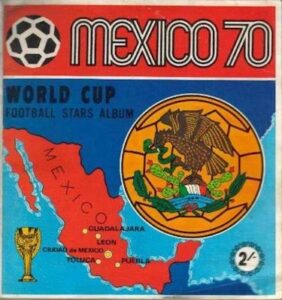Book Review – Blood on the Crossbar: The Dictatorship’s World Cup by Rhys Richards
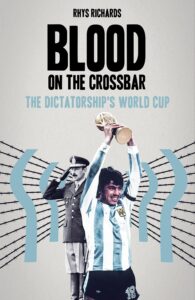 18 December 2022 – the Lusail Stadium. Lionel Messi receives the FIFA World Cup trophy after one of the most dramatic finals in the competitions history. This is Argentina’s, La Albiceleste (The White and Sky Blue), third triumph following wins in 1978 and 1986. However, for all the magnificence of the final, the first World Cup to be held in the Arab world has been a controversial one even from the point Qatar were awarded the event back in December 2010. Rumours circulated how votes had been ‘bought’ to ensure the tiny but incredibly wealthy state became hosts, with many around the globe pointing to Qatar’s human rights record as a significant and compelling reason for the country to be stripped of the 2022 event.
18 December 2022 – the Lusail Stadium. Lionel Messi receives the FIFA World Cup trophy after one of the most dramatic finals in the competitions history. This is Argentina’s, La Albiceleste (The White and Sky Blue), third triumph following wins in 1978 and 1986. However, for all the magnificence of the final, the first World Cup to be held in the Arab world has been a controversial one even from the point Qatar were awarded the event back in December 2010. Rumours circulated how votes had been ‘bought’ to ensure the tiny but incredibly wealthy state became hosts, with many around the globe pointing to Qatar’s human rights record as a significant and compelling reason for the country to be stripped of the 2022 event.
This however was not the first time that the staging of the World Cup finals in a particular nation has proved to be contentious. Roll back the clock to 1978 with the finals being held in Argentina for the first time and we have a tournament that was equally controversial.
Rhys Richards’, Blood on the Crossbar: The Dictatorship’s World Cup, explores what was the eleventh World Cup finals and is a brilliant read. This well researched book is not just about the tournament itself, but also social and political history within the South American country in the late 1970s.
Two years before the finals Argentina had been subject to a military coup with the democratically elected president, Isabel Peron, ousted by General Jorge Rafael Videla. This was a dictatorship that ruthlessly imprisoned, tortured and killed anyone who opposed the regime and used the World Cup as a massive propaganda exercise.
As a young teenager at the time, and even without England having qualified, all I naively cared about was the football, and knew nothing of the political situation. The book was therefore a real eye-opener in learning not only about the cruel and brutal administration, but about the opposition that existed both within Argentina and abroad. For instance, Los Montoneros (a left wing organisation who supported Peron) who as part of their protest, on a number of occasions were able to hijack the audio of Argentina’s games in certain locations. There was also deep concerns in Europe, and a Dutch alternative cabaret duo Bram Vermeulen and Freek de Jonge began a campaign for the Netherlands to boycott the finals. The title of their show was Blood on the Crossbar, and “focused on the crimes of the dictatorship and the use of the World Cup as a sports-washing project.” They attempted to work with the Dutch Football Association (KNVB) but ultimately failed and ironically the Dutch squad were then used in part of the propaganda war ahead of the Final, with an article appearing purporting to be from Rudi Krol, praising the hospitality, the organisation and the military – all the content however was a forgery.
Richards though for all his excellent exploration of issues off the pitch, doesn’t forget about those on the pitch taking readers through the matches group by group and dealing with some of the other controversies associated with the tournament, such as the allegations of drug taking by the Argentina players, and most especially the 6-0 beating of Peru that put La Albiceleste through the Final.
The teenage me remembers the Final and the sea of ticker-tape that rained down from the stands of the Estadio Monumental. I’d never seen anything like it and was then proceeded to be dazzled by the performance of Mario Kempes and his compatriots. Now though after reading this book, those innocent boyish feelings and recollections are now tempered by an adult realisation of what lay behind the scene in the name of sport.
La Albiceleste’s win in 1986 will always be associated with the brilliance of Maradona whilst 2022 saw a fairy-tale ending for Messi’s. Yet that first win in 1978 has to deal to this day with the stigma of association with the junta. However, this book redresses the balance and is a homage to the 1978 winners of Argentina’s first World Cup triumph and leaves you with some sympathy for the group as Richards attempts to give them separation from the association with the dictatorship and the horrors of the regime of the time.
(Publisher: Pitch Publishing Ltd. September 2022. Hardcover: 304 pages)
Buy the book here: Blood on the Crossbar
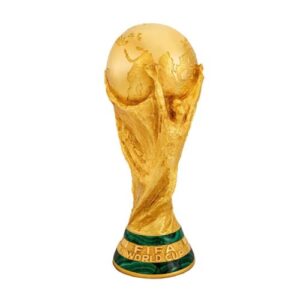 2022 WORLD CUP FINAL: Argentina 3 (2) – (0) 3 France AET [Argentina won 4-2 on penalties] (Lusail Iconic Stadium, Lusail)
2022 WORLD CUP FINAL: Argentina 3 (2) – (0) 3 France AET [Argentina won 4-2 on penalties] (Lusail Iconic Stadium, Lusail)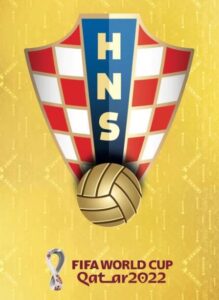 Croatia 1 (0) – (0) 1 Brazil AET. Croatia won 4-2 on penalties (Education City Stadium, Al Rayyan)
Croatia 1 (0) – (0) 1 Brazil AET. Croatia won 4-2 on penalties (Education City Stadium, Al Rayyan)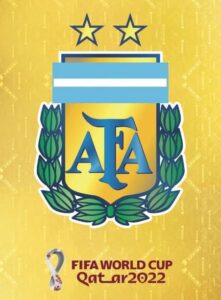 Netherlands 2 (0) – (1) 2 Argentina AET. Argentina won 4-3 on penalties. (Lusail Iconic Stadium, Lusail)
Netherlands 2 (0) – (1) 2 Argentina AET. Argentina won 4-3 on penalties. (Lusail Iconic Stadium, Lusail) Morocco v Portugal (Al Thumama Stadium, Doha)
Morocco v Portugal (Al Thumama Stadium, Doha) England v France (Al Bayt Stadium, Al Khor)
England v France (Al Bayt Stadium, Al Khor)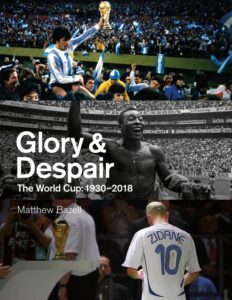 Glory and Despair is a pictorial celebration of the World Cup that takes us on a spellbinding journey, from the inaugural tournament in 1930 to the present day.
Glory and Despair is a pictorial celebration of the World Cup that takes us on a spellbinding journey, from the inaugural tournament in 1930 to the present day. In the Introduction to In the Heat of the Midday Sun, Steven Scragg puts forward, a theory “that you’re chemically wired to your first World Cups.”
In the Introduction to In the Heat of the Midday Sun, Steven Scragg puts forward, a theory “that you’re chemically wired to your first World Cups.”